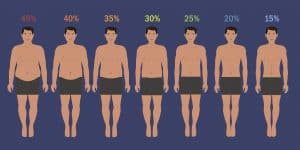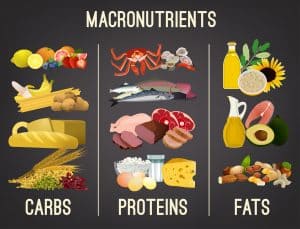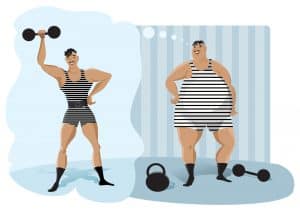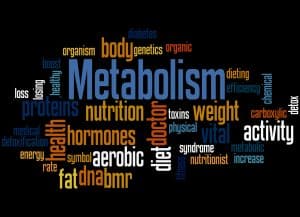With so much diet advice circling constantly, it’s hard to determine the facts on food.
For example, carbs have a bad reputation—resulting in people adopting unhealthy, restrictive meal plans. While some provide results, the problem is, low-carb regimes aren’t sustainable.
Through trial and error, I’ve learned to eat intuitively—listening to what my body needs, instead of dictating what it wants according to the latest trend.
By incorporating quality carbs, they don’t scare me anymore.
In this article, I discuss good carbs vs. bad carbs.
What Are Carbohydrates?
Carbs or carbohydrates are one of the three macronutrients alongside protein and fat. Your body needs all of them to function correctly—carbs being the primary source of energy.
When you consume a meal, your digestive system converts any carbs into glucose (blood sugar)—which your body uses to fuel your cells, organs, and tissues.
There are three primary types of dietary carbohydrates:
- Sugars—short-chain carbs (made up of one or two sugar compounds) that are typically sweet, such as glucose, fructose, and sucrose.
- Starches—long-chain carbs (consisting of multiple sugar units) that the digestive system breaks down into glucose.
- Fiber—aids digestion.
Why Bodybuilders Should Care About Carbs (Good and Bad)

Carbohydrates are important not only for optimizing the fitness level but also for general health. Let’s discuss in detail the benefits at each level, then we’ll dive deep into classifying carbohydrates into good and bad!
Fitness
Preserves Muscle
Lack of carbs leads to a chain reaction. If glucose isn’t present and stores (glycogen) deplete, your body will seek alternatives. It breaks down the protein in your muscles for fuel (gluconeogenesis)—causing loss of lean mass.
Carb consumption keeps your body’s preferred fuel source in ready supply—and staves off this attack.
Promotes Gains
Consuming carbs leads to insulin response. This hormone is the key to carrying protein into musculature—it stimulates muscle protein synthesis by increasing blood flow and amino acid delivery to your muscles.
Remember, it is not always possible to build muscle on extremely low carbs (keto).
Fuels Training
During Intense and strenuous training sessions, like when lifting weights, you require a constant, sufficient supply of carbohydrates. Without it, you won’t be able to perform your workouts efficiently.
Health
Our bodies rely on carbs to perform necessary activities. Your brain, in particular, is a carb-hungry machine.
It’s also essential for maintaining homeostasis. That is, the physiological balance that keeps you alive and kicking. Heart rate, hormones, and core temperature are just a number of the processes that continuously adapt to reinforce this body “harmony.”
Depriving yourself of adequate carbs can put you at risk for malnutrition, deficiencies, and improper brain function. Think of your body as a car and carbs as the fuel—it can’t run without it.
Make sure to meet your carbohydrate needs.
The Institute of Medicine (IOM) recommends 45-65% of your total daily intake should consist of carbs. Based on a diet of 2000 calories per day, that equates to between 900-1300 calories from carbs—or 225-325 grams.
Good Carbs vs. Bad Carbs
As we’ve seen, not all carbs are the same—some are good, some bad, and some sufficient enough.
Let’s go over the differences between simple and complex carbs to determine which are optimal for health and fitness:
Simple Carbs
Simple carbs (sugars) are broken down quickly and easily digested. Most of these foods don’t contain fiber—which slows down digestion—and they also lack essential micronutrients.
This leads to a quick spike in energy—and typically results in “crashing” soon after.
Processed and refined foods make up most of the simple carbs. These are the bad carbs and, for ultimate health and fitness, should be avoided.
Simple carbs to avoid:
- Simple Carbs To Avoid
- White rice—stripped of any goodness during processing, many producers have to enrich it to add any kind of nutritional value.
- Table sugar—sucrose—a simple sugar that will skyrocket your blood sugar.
- White bread—refined carbohydrates that lack essential nutrients.
- French fries—potatoes in their natural state are good carbs. Yet, in a fried form, they’re full of unhealthy fats and excessive levels of sodium.
- Baked goods—pastries, cakes, cookies—super high in sugar but low in nourishment.
- Candy—full of empty calories and they’re also bad for your teeth. If you’re craving something sweet, opt for dark chocolate.
- Soda—sugar-laden drinks can cause irritations in the stomach lining and they’re also linked to an increase in diabetes.
- Potato chips—all of the nutrients in potatoes are lost in the chip-making process. They also contain high amounts of trans fats, saturated fats, and salt.
However, not all simple carbs are bad.
Foods like fruits, certain vegetables and milk-based products naturally contain simple carbs. Yet, their wholesome nutrient content far outweighs and therefore, counteracts the negatives seen in typical bad carbs.
Hence, consume any kind of vegetable—preferably a variety—and a mix of fruits every day.
Complex Carbs
Complex carbs (starches) take longer to break down in the body. This means glucose releases at a more consistent rate. They’re also rich in fiber, which aids digestion.
As a result, you’re satiated and continuously energized throughout the day.
The healthiest complex carbohydrates tend to be the least processed or refined, or are from natural origins—such as whole grains, root vegetables, nuts, and legumes. These are the foods you’ll want to eat for optimum energy supplies.
Complex carbs include:
- Complex Carbs to Eat
- Rice—brown rice, wild rice, and basmati remain in their natural state, containing essential nutrients and fiber needed for healthy digestion.
- Whole wheat bread, pasta, and flour—made from whole grains and packed with healthy fiber and nutrients.
- Whole grains—steel-cut oats, barley, and quinoa—rich in fiber, potassium, magnesium, and selenium.
- Beans and peas—solid sources of fiber, folate, iron, and potassium.
- Starchy vegetables—potatoes, butternut squash, pumpkin, and carrots.
- Leafy greens—these ”super-greens” are packed with essential micronutrients.
- Nuts and seeds—almonds, walnuts, cashews, flaxseeds, hemp, and pumpkin seeds.
The Glycemic Index (GI)
The glycemic index is a scale that ranks carb-containing foods based on how much it affects blood sugar levels over two hours. It gives you an outline of how fast your body converts carbs into glucose.
Lower GI foods have less impact on your blood sugar levels. Below is a general reference:
Low GI
55 or less
Moderate GI
56-69
High GI
70 or more
Simple carbs that are broken down quickly and easily digested have a higher glycemic index—usually over 70. Complex carbs cause a slower glucose response and have a GI of less than 55.
Medium-GI foods are not necessarily bad carbs—but not ideal for a constant, stable release of energy.
These include:

Sweet Potatoes:
GI=54
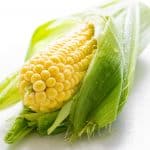
Corn:
GI=55
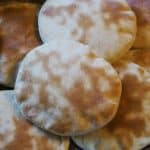
Pita Bread:
GI=57
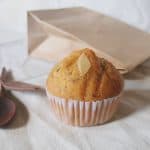
Bran Muffin:
GI=60
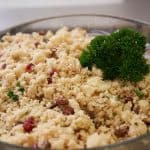
Couscous:
GI=65
It’s cardinal to keep in mind that not all high-GI foods are bad and not all low-GI foods are good—they can overlap. For example, ice-cream has a low glycemic value but isn’t considered a health food. The GI-scale is a general guideline with some exceptions.
What About Fiber?
The human body can’t absorb dietary fiber—so why is it important to include it in your diet? Eating carbs that contain fiber will aid digestion.
The solubility of fiber is its ability to dissolve in water. Try to include a variety of both soluble and insoluble fiber foods in your diet to reap the benefits of both:
Soluble Fiber:
It forms a gel-like substance by blending with water in your gut. It also slows digestion, which has a duel effect—allowing you to absorb more nutrients and reduces unwanted spikes in blood glucose.
Examples include:
- Oatmeal.
- Citrus fruits.
- Berries.
- Lentils.
- Beans and peas.
- Barley.
Insoluble Fiber:
This type passes through the digestive tract intact and adds bulk to your meal—allowing for speedy movement of food and waste through your gut. These foodstuffs will also keep your bowels regular.
For good carbs that include insoluble fiber, look out for foods, such as:
- Whole-grain foods.
- Root vegetables.
- Fruit with edible seeds.
- Pulses and lentils.
- Nuts and seeds.
Fiber also has satiety appeal—it makes you feel fuller for longer, which can assist with weight loss or maintaining a healthy weight.
The daily recommended intake of fiber for adults is 38 grams per day for men and 25 grams per day for women.
Three Most Common Myths About Carbs
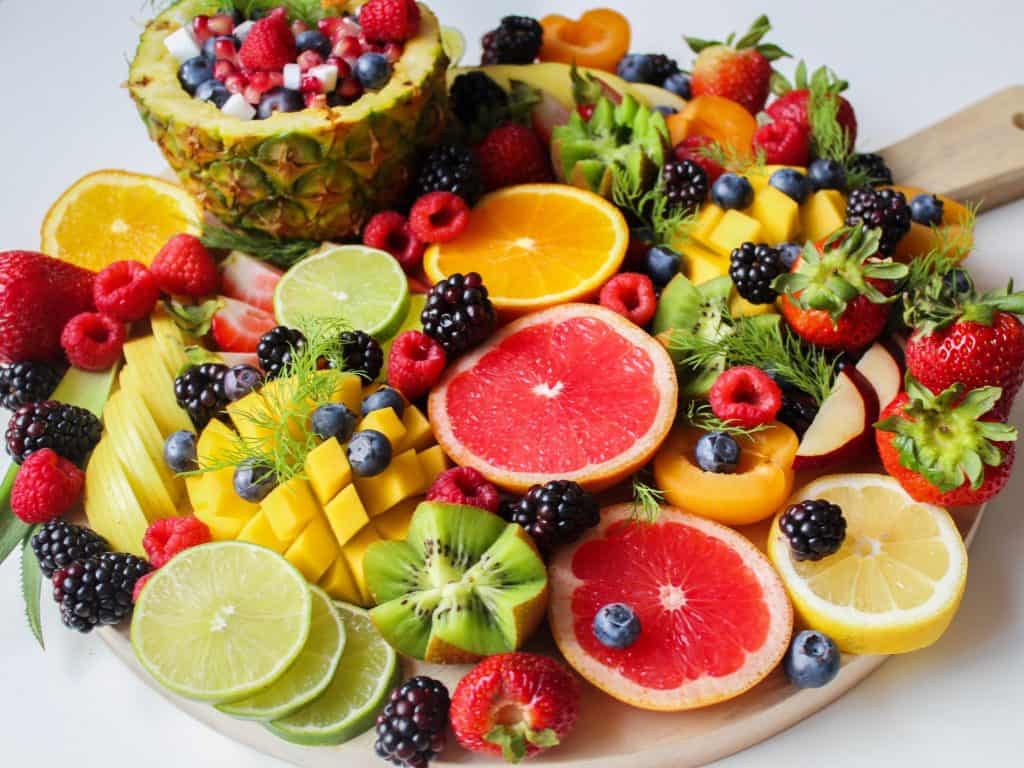
You’ll Gain Weight
Thanks to the myriad of fad diets that encourage carb restriction, we’ve been made to believe that all carbs will make you fat. This is misinformation.
It depends on the type of carbs you’re consuming—and how much. You should also take into account other ingredients in carb-rich foods.
Of course, overeating on a regular basis will make you gain weight. However, consuming complex carbs will make it easier to stick to your daily recommendation since they increase satiety.
Foods like desserts and pastries are usually the type of bad carbs that can make you pile on the pounds—containing excess calories and sugar. Not only will they skyrocket your glucose levels, but they’re also nutritionally insufficient.
These foods are “empty” and serve no benefit other than pleasing your taste buds.
You don’t need to void yourself of bad carbs completely—cheat days are critical, they can help you stay on track. But to maintain a healthy weight, be sure that the majority of your carb intake is from high-quality sources.
Fruit is Bad
We often hear, “fruit is high in sugar.”
This is true. But they’re also a quality source of fiber, which will counteract any glucose spike—and they’re very nutrient-dense. Experts recommend consuming 1.5-2 cups of fruit per day.
Don’t be scared of fruit—they’re one of the few simple carbs that are beneficial. Sticking to your daily recommendation will help maintain your weight and overall health.
All White Foods Are Unhealthy
Many processed or refined foods can be described as “white” in appearance. Yet, natural foods possessing similar coloration aren’t inherently bad.
There are a lot of light-colored foods that provide health benefits such as antioxidants, immune support, and weight maintenance.
For example, potatoes have a bad name as a result of this—which is rather unfair since they’re a good source of fiber, potassium, vitamin C, and niacin (vitamin B6).
Other healthy white-like foods include:
- Nuts and seeds.
- Cauliflower.
- Beans.
- Onions and garlic.
- Apples.
Takeaway
Carbohydrates are an essential part of any balanced diet. They provide the energy you need to perform daily activities, keep your body functioning and fuel intense workouts.
Instead of restricting carbs, learn to weigh up good carbs vs. bad carbs and make the right food choices.
Carbs are your friend—choose wisely, and they’ll be good for you.








